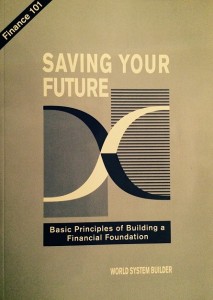‘Saving Your Future:’ An excellent starting point
By Lorie Therese Locara
Money. Everyone wants it, but only few know the secret on how to amass it.
This is why Warren Buffett is such a celebrity, even if he, as the articles report, prefers to live a low-key lifestyle: People want to know how he got unbelievably rich. People want to emulate him. People want to BE him.
And this is why Personal Finance gurus such as Dave Ramsey, Suze Orman, Robert Kiyosaki, Thomas Stanley, David Bach, and even self-improvement guru-turned-personal finance guru Tony Robbins, are so popular: People want to be financially liquid. They want financial freedom, and they will read what they can, in order to know how to manage their money better.
An excellent resource that I’ve come across is this comprehensive overview of the essentials in personal finance, or managing your budget: “Saving Your Future.” Exclusively available from the World System Builder (WSB) Group, you can’t afford to not have this book in your arsenal of personal finance resources.
There are three things that I love with this book:
• This book covers all the necessary and crucial topics for Personal Finance. It leaves nothing out, and it even gives the reader the right perspective on Insurance.
• This book, while comprehensive, covers all the topics without overwhelming the reader. It is delivered in a way that even a high school-level student can comprehend the topics covered.
• This book is very well-written. Evidenced by the easily-digestible way that the book is laid-out, the engaging manner that it reads, I’d say that “Saving Your Future” gets its message across, making it an effectively and excellently-written resource.
My main impression, in reading “Saving Your Future,” was that I wished that I had taken a course that took me through this book in my high school or college years. I could have saved myself a whole lot of financial grief, and not wasted a considerable amount of time in my 20s. While some of my friends have said that the 20s are spent enjoying one’s newfound relative financial independence, and the 30s are spent securing one’s future, if I had this book while I was younger, I would have pushed back the stage meant for the 30’s a whole decade earlier.
But there’s no room for regrets. The only way to live this life is to live it with an eye towards the future.
My main takeaways in reading “Saving Your Future” include:
• The Wealth Formula. According to Saving Your Future, Wealth is a function of Money + Time +/- Rate of Return – Inflation – Taxes. This means that one’s wealth is a net total of your income, the time that you have to leverage compound interest, the rate of return on the financial vehicle that you choose to plug your money into, but you have to factor in inflation and taxes as well. So when you choose a financial vehicle to invest in, it has to give you a return that keeps your money at levels higher than the prevailing inflation rates, as well as the taxes that could be deducted from your money when you choose to withdraw it from the financial/investment medium.
This simply blew my mind, because I never really paid attention to the “subtract inflation” and the “subtract taxes” from other Personal Finance books or blog posts I’ve read. I’ve personally tried mutual funds before, and I never really paid attention to the minuses that one has to take into consideration when investing or building wealth. “Saving Your Future” highlighted those factors for me when I read the Wealth Formula section. This formula is then expounded to explain how much you gain over time, thanks to the law of compounding interest, and that’s when things get interesting. For me, that’s also when the regrets set in, but then, like I said, we move on and we look forward to the future.
• The X-Curve. The X-Curve shows a simple way to understand how our financial lives should look like: While younger, we have more time and more energy to build wealth. We are at the prime of our lives. And this is also the time when we still have a lot of responsibilities. But when we are older, we have less energy, and our bodies no longer let us carry more responsibilities. So had we used our time as younger people to build our wealth, we would be able to enjoy more when we’re older.
• Taxable, Tax-Deferred, And Tax-Free Financial And Investment Vehicles. As a fledgling investor in the past, I didn’t even look at the taxes that could be deducted from the investment vehicle I chose. I only looked at its average rate of return, which isn’t even an effective measure of whether that vehicle will earn me more money, or cause me to lose money over time. Reading about how taxes can affect the way we invest certainly made me realize that I should be more discerning about where to invest.
“Saving Your Future,” on the whole, is a resource that I enthusiastically recommend to those who want to quit being dragged through life by this world’s financial systems. This is the best bird’s-eye view for the uninformed. This should be one’s first-ever reading if you’d like to get started living a financially wiser life. There were personal finance books I actually wish I didn’t read. I wish I started with this instead. So if you’re getting tired of living from paycheck to paycheck, and you would like to make sure that you enjoy your retirement years, get started on your personal finance journey with this book.
And if the concepts are still foggy to you, as they can be, this book is best explained by a friend. Get in touch with someone who can work through “Saving Your Future” with you, by emailing hello@livewealthiertoday.com.













